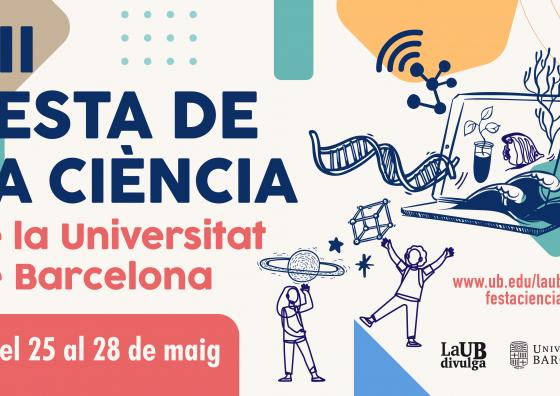The University of Barcelona held, during the week of May 24th, 2021, the VII Science Fest of the UB. This is the second year that the event has taken place online, still, it offered a wide range of activities to bring the research that is carried out in Universities closer to the general public.
This year’s edition had activities both for general audiences and schools. You can check out the full programme on the YouTube channel of La UB Divulga.
With this initiative, the Scientific Culture and Innovation Unit wants to contribute to increase the current offer of scientific activities and resources to enjoy from home. This is also an opportunity to captivate citizens with research and outreach. The Science Fest wants to be a means to achieve a better and more sustainable future for all of us, that is why the Sustaiable Development Objectives (ODS) are stated in all the activities.
The Institute of Cosmos Sciences of the UB participated in the day with the following activities:
WORKSHOP: 3D CONSTELLATIONS
By the Quantum Physics and Astrophysics Department of the UB and the Institute of Cosmos Sciences (ICCUB).
When we look at the night sky, we can see that the stars are grouped together forming certain outlines. Although every person will imagine them to be different things, there are figures stablished by tradition that group together all the stars on the sky. These groups of stars are known as constellations. Even though it may not seem like that, the different stars that form a constellation are not all at the same distance from us, but they can be very far away from each other. They can also have different colours depending on their temperature, be shinier or dimmer and be larger or smaller.
With this workshop you will have the chance to build your own 3D miniature of the Orion Constellation, having into account the position and distance of the stars forming it. You will see that perspective changes the appearance of the constellation and that what we see at night is just a 2D representation of reality!
LIQUID NUCLEI
By the Grup de Física Hadronica, Nuclear i Atòmica, Institut de Ciències del Cosmos, Iniciativa Binding Blocks, Universitat de York, Universitat de Surrey, Science and Technology Facilities Council.
Nuclei and water balloons have a lot in common. In this video we bring you an activity proposal for high school or A levels students to manipulate the liquid drop model that allows us to understand the properties of the nuclear binding energy. Working with a simple excel spreadsheet, you will be able to fit the model to the experimental nuclear data and even predict the limits of the existence of unknown isotopes.
More information
- Once you have seen the video, follow these instructions
- Excel spreadsheet
- Finish the activity by filling up the activity survey




